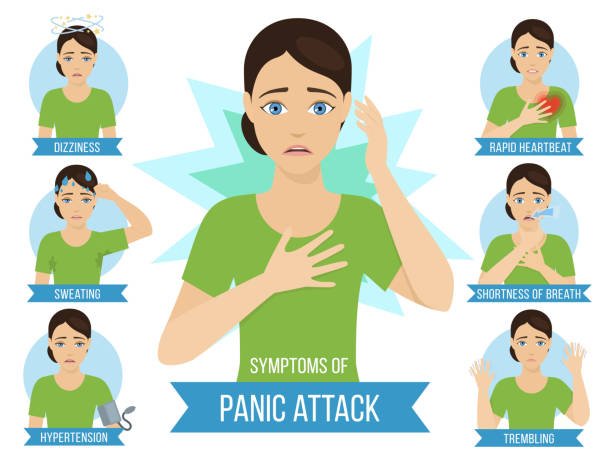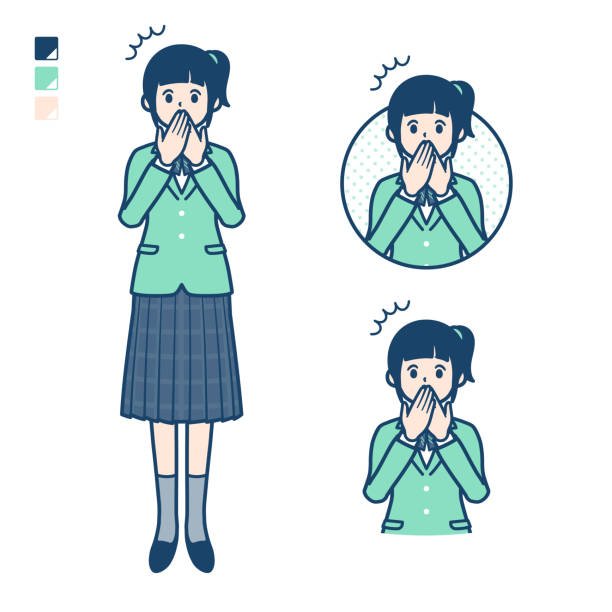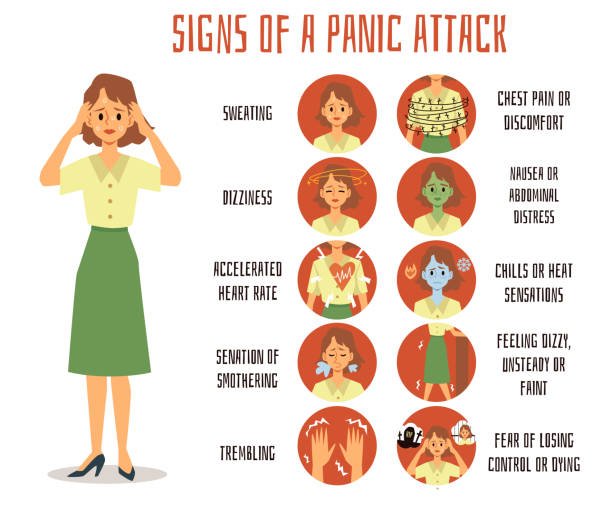Panic Attack
Panic attacks can be staggeringly overpowering, frequently showing up out of the blue and causing serious trepidation and distress. While they could feel upsetting and dumbfounding, mental breakdowns are more ordinary than many comprehend, and understanding the signs can help you with seeing when one is going on. Whether you’ve encountered fits of anxiety previously or figure you might be having one interestingly, realizing the side effects can be a urgent move toward overseeing and answering them. The following are 14 signs that you could be having a fit of anxiety:
1. Rapid Heartbeat (Palpitations)
One of the most common and observable symptom of a fit of anxiety is a fast or unpredictable heartbeat. Known as palpitations, this sensation can feel like your heart is hustling, thumping in your chest, or undulating. It’s normally joined by sensations of fear or uneasiness, which escalate the actual experience.
2. Sweating Excessively
Unreasonable perspiring, in any event, when you’re not genuinely endeavouring, can be a sign of free for all. This sweating could occur in your palms, underarms, or face and may be unessential to temperature or dynamic work. It can make a mind-boggling feeling of uneasiness and frequently adds to the vibe of being crazy.
3. Shortness of Breath
Another normal sign is trouble breathing or feeling like you can’t slow down and rest. You could feel like you’re wheezing for air, regardless, when you’re not trying. This can cause you to feel tipsy or bleary eyed and may cause sensations of suffocation or an apprehension about gagging.

4. Chest Pain or Tightness
Chest discomfort during a panic attack is often described as tightness, tension, or sharp torment. While this can be a terrifying sensation and may cause worry for heart issues, it’s vital to take note of that fits of anxiety don’t cause heart harm. In any case, the distress can impersonate the impression of a coronary episode, which is the reason it’s significant to view this side effect in a serious way and talk with a specialist in the event that you’re uncertain.
5. Tingling or Numbness
A feeling of shivering or deadness, particularly in your grasp, feet, or face, is a run of the mill indication of a fit of anxiety, is a normal sign of a mental breakdown. This sensation is every now and again on account of hyperventilation (quick breathing), which can diminish how much carbon dioxide in your blood and lead to dazedness and real deadness or shuddering.
6. Dizziness or Feeling Faint
Many people encountering a fit of anxiety report feeling tipsy or like they are going to swoon. The mix of quick breathing, extended beat, and the surge of adrenaline can cause drunkenness, making it trying to remain grounded at that point.
7. Choking Sensation
A few people portray feeling like they are stifling or that something is caught in their throat during a fit of anxiety. This can elevate the sensation of craze and cause breathing to feel significantly more inconvenient. It’s memorabilia’s essential that this sensation, while upsetting, is brief and is an actual reaction to tension, not a serious deterrent.
8. Shaking or Trembling
Shaking or shudder, particularly in your grasp, legs, or body, is another indication of a mental episode. This can be achieved by a flood of adrenaline in your system, as your body prepares for “endurance.” This actual reaction can cause you to feel truly frail or crazy.
9. Feeling Detached or Unreal (Derealization)
During a fit of anxiety, you could encounter sensations of separation from the real world. This sensation is every now and again suggested as derealization or depersonalization, where you feel separated from your natural elements or yourself. It can cause all that to appear to be dreamlike, similar to you’re noticing what is going on from a good ways, which can be disrupting and startling.

10. Nausea or Upset Stomach
A fit of anxiety can set off a scope of gastrointestinal symptom for example, sickness, stomach cramps, or the inclination that you really want to upchuck. The body’s endurance response can redirect blood from the stomach, provoking stomach related issues.. This can deteriorate the uneasiness, particularly in the event that you begin to stress over the actual side effects.
11. Hot or Cold Flashes
During a panic attack, some people experience sudden changes in body temperature, like feeling hot or cold flashes. These temperature changes can add to the sensation of uneasiness and bewilderment. Perspiring and chills are normal, and you could feel flushed or shivery despite the fact that you’re not truly sick.
12. Intense Fear or Terror
At the heart of a panic attack is frequently a staggering feeling of dread or fear. You might encounter an unexpected and unreasonable feeling of dread toward passing on, letting completely go, or going off the deep end. This serious uneasiness is normally lopsided to the circumstance, and it can feel like an approaching disaster is going to occur. Essential to remind yourself fits of anxiety, while terrifying, are not perilous.
13. A Feeling of Losing Control
Many people report feeling as though they are losing control of their thoughts, actions, or feelings during a fit of anxiety. This feeling of feebleness can build the force of the nervousness and cause what is going on to feel considerably really overpowering. A few people might fear they will humiliate themselves or not be able to stop the frenzy whenever it has begun.
14. A Strong Urge to Escape or Avoid Situations
Because panic attacks are so distressing, individuals frequently feel a mind-boggling desire to get away from the circumstance or climate where the assault started. Whether it’s a packed space, a particular area, or even a cooperation with somebody, the need to escape or stay away from the circumstance can overwhelm. This can some of the time lead to agoraphobia, a feeling of dread toward circumstances where getaway might troublesome or humiliate.
What Causes Panic Attacks?
Panic attacks can happen because of multiple factors, and the causes could change starting with one individual then onto the next. A few normal triggers include:
- Stressful Life Events: Significant life altering events like a new position, relationship issues, or the passing of a friend or family member can set off fits of anxiety.
- Genetics: On the off chance that you have a family background of nervousness or frenzy issues, you might be more inclined to encountering fits of anxiety.
- Health Conditions: Certain ailments, including heart issues, respiratory problems, or thyroid lopsided characteristics, can emulate or add to fits of anxiety.
- Substance Use: Liquor, caffeine, and medications can incite fits of anxiety or exacerbate nervousness.
- Past Trauma: Encountering injury, particularly in youth, can prompt fits of anxiety further down the road.

How to Manage a Panic Attack
While panic attacks are undesirable, there are frameworks you can use to administer and restrict their impact. The following are a couple of methodologies that can help:
- Breathing Exercises: Focus on languid, full breaths. Make a pass at taking in for a count of four, holding for four, and breathing out for four. This can help with coordinating your breathing and abatement hyperventilation.
- Grounding Techniques: Utilize your faculties to ground yourself right now. For instance, centre around objects around you, contact something finished, or count in reverse from 100.
- Cognitive Behavioural Techniques: Challenge irrational thoughts by advising yourself that the fit of anxiety is brief and not hazardous. Perceive that the side effects, while extraordinary, will ultimately die down.
- Seek Support: Reach out to a friend, family member, or a mental health proficient in the event that you’re battling with continuous fits of anxiety. Treatment, like Mental Social Treatment (CBT), can be exceptionally compelling in tending to basic tension.
- Medication: at times, prescription recommended by a medical care supplier can assist with overseeing tension and decrease the recurrence of fits of anxiety.
When to Seek Professional Help
If you experience panic attacks frequently or they begin to interfere with your daily life, looking for help from an emotional wellness professional is significant. Treatment can assist you with understanding the fundamental reasons for your fits of anxiety, while drugs might give extra alleviation at times.
In the event that you’re uncertain whether you’re encountering a fit of anxiety or something more serious, it’s consistently really smart to counsel a medical care supplier to preclude any ailments. Continuously decide in favour alert with regards to your wellbeing.
Conclusion
Panic attacks are intense, frightening experiences, but they are treatable. Perceiving the signs from the beginning is the most vital phase in dealing with the circumstance actually. While the physical and profound symptoms can feel overpowering, with the right help and methods, you can recover command over your uneasiness and carry on with a satisfying life. Assuming you’re encountering fits of anxiety, recollect that you’re in good company, and help is available to guide you through the process of recovery.
[sp_easyaccordion id=”4556″]

Dr. Hamza is a medical content reviewer with over 12+ years of experience in healthcare research and patient education. He specializes in evidence-based health information, medications, and chronic conditions. His reviews are grounded in trusted medical sources and current clinical guidelines to ensure accuracy, transparency, and reliability. Content reviewed by Dr. Hamza is intended for educational purposes and is not a substitute for professional medical advice.